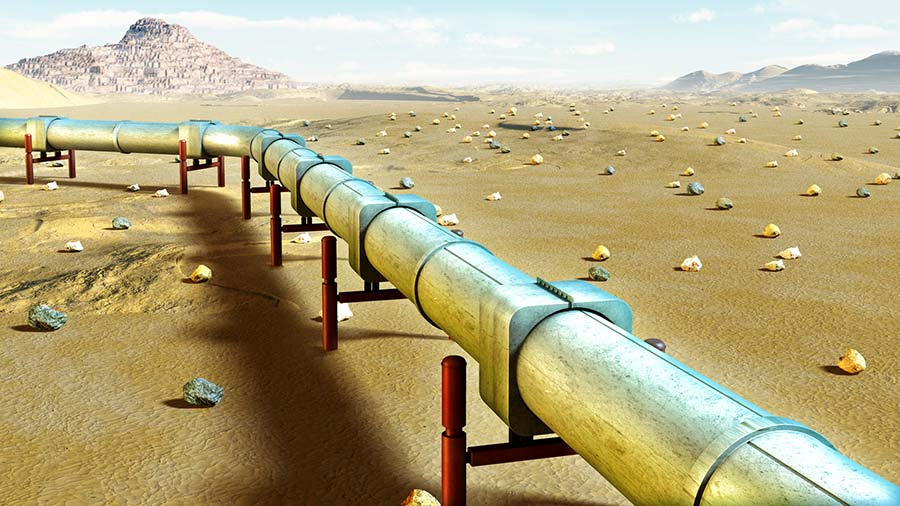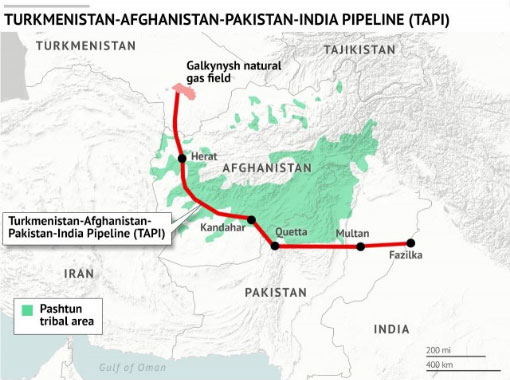Taliban Says OK For Afghanistan TAPI Gas Pipeline Work To Continue As Kabul Banks Reopen

Signs of normality returning as Afghani banks reopen and national infrastructure projects restart
Taliban spokesman Suhail Shaheen said that one of the group’s main priorities, once it has established itself in power in Afghanistan, is to push ahead with the TAPI gas pipeline that Turkmenistan hopes will link its gas fields to consumers in Pakistan TAPI is supposed to cross Afghanistan and the Turkmen government had worried that the reemergence of the Taliban may undermine its plans.
Yesterday, the Taliban announced that Afghanistan’s banks, including the Central Bank, would reopen today and urged employees to return to work. Mohammed Idris, a previously little known official has been appointed as Acting Central Bank Governor. The World Bank, acting under US pressure, has suspended its aid program to the country in response.
Concerning TAPI, the Turkmen section of the pipeline is near completion, with the country eager to commence exports. They are not alone: Russian gas companies Rosneft, Lukoil, and Gazprom are all eager to take part in developing oil and gas fields in Turkmenistan, while India is energy poor and needs supplies.
The Turkmenistan–Afghanistan–Pakistan–India Pipeline (TAPI), also known as Trans-Afghanistan Pipeline, is being developed by the Galkynysh – TAPI Pipeline Company Limited with participation of the Asian Development Bank. The pipeline will transport natural gas from the Galkynysh Gas Fields in Turkmenistan and run through Afghanistan into Pakistan and then to India. Construction on the project started in Turkmenistan on 13 December 2015, work on the Afghan section began in February 2018, and work on the Pakistani section was planned to commence in December 2018 but has been delayed, in part due to problems with Covid-19. India has already completed its part of the pipeline.

The 1814-kilometer pipeline has been designed for a 30-year period and is expected to supply about 33 billion cubic meters (bcm) of gas per year from Turkmenistan’s giant Galkynysh gas field through the Afghan cities of Herat and Kandahar, as well as the Pakistani cities Quetta and Multan. The pipeline ends at the Indian city of Fazilka, located near its border with Pakistan.
Five bcm out of the entire volume will be absorbed by Afghanistan, while Pakistan and India will receive 14 bcm each. There have also been discussions about China joining the route. If so, this would require the building of a new link from Pakistan to China. This could act as alternative to Chinese plans to build a fourth China-to-Turkmenistan pipeline, which has to cross several mountain ranges, meaning it would be cheaper and easier for China to build a line from Pakistan across the Karakoram Range to its Western border.
For the Taliban, securing the TAPI pipeline has been a major part of their drive to power in Afghanistan. TAPI will not only provide energy resources to the country, but also provide revenues in the form of transit fees.
Having a Taliban Government in place has not been the ideal solution for Central Asia, China or Russia, however the onus is now on providing the Taliban with security in terms of governance as the alternative would be a slide into what could be an ongoing civil war. The Taliban are considered the better option, which is why China, Russia and other regional powers such as Pakistan and to some extent India and Iran will support a Taliban regime – at a time when the West appears to have tried its best to destabilize the region, and cut off any financial assistance. The US also holds Afghanistan’s Sovereign Gold Deposits and has refused to release them. Motivations for doing so are the rich gas fields in Central Asia in addition to the mineral wealth in Afghanistan. Both China and Russia will be looking for stability, including with the Taliban to both access these commodities and retain the peace. The United States would prefer this wealth not to have been inherited in this fashion, and it remains to be seen if further attempts at destabilizing Afghanistan will continue.
Related Reading
About Us
Silk Road Briefing is written by Dezan Shira & Associates. The firm has 28 offices throughout Asia, and assists foreign investors into the region. For strategic advisory and business intelligence issues please contact the firm at silkroad@dezshira.com or visit www.dezshira.com





